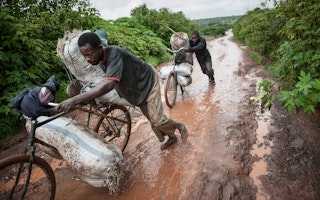EU Human Rights Strategy Bears Lessons of Burma and Arab Revolutions
By Heather Grabbe
“To be forgotten is to die a little,” said Daw Aung San Suu Kyi on accepting her Nobel Peace Prize. Her words are an important reminder that strong statements on human rights in one part of the world do not fall on deaf ears in the rest. Not only do prominent dissidents and human rights defenders take heart from political support for their cause, but the message is also heard by ordinary people suffering oppression and indignity.
This week the European Union (EU) showed it has learned lessons both from Burma and from the Arab revolutions, when it committed itself to integrating human rights into all of its external policies. The “strategic framework” and action plan adopted by EU foreign ministers at the end of June outline “principles, objectives and priorities” for human rights and democracy across the broad spectrum of external action, from development to trade and energy policies. Human rights will be incorporated more broadly than the “silver thread” initially promised by High Representative Catherine Ashton.
The hard part will be turning these fine words into the ability to hold governments to account. Baroness Ashton is now recruiting an EU Special Representative for Human Rights, and the first task for the holder of this new post will be to build relationships with member states to ensure their sustained support in implementing the new agreements. It is capitals that most often undermine EU stances on human rights, by cutting bilateral deals with dictators that suit their national energy or security interests but undermine the European cause of promoting better governance and freer societies in those countries.
The Arab revolutions last year highlighted the contradictions between the EU’s stated commitments to human rights and close ties with regimes which repressed them. The EU’s institutions and member-states have now committed themselves to being “exemplary” on human rights within their borders, and “jointly responsible” for their promotion externally. The challenge now is to live up to the new commitment to coherence when remaining autocrats try to use their energy and commercial relationships with the EU to give them a free pass on human rights. Can EU leaders take a more consistent line with dictators who are still in power? The EU finds it so much easier to be tough on Belarus, which does not supply energy to Europe, than with oil and gas-rich regimes like Azerbaijan, which has a similarly appalling human rights record.
Another lesson from North Africa is how important are transparency and outreach to civil society, which the human rights strategy rightly calls on EU governments to promote. This is important to get away from relying primarily on contacts with governments in many countries. Once Mubarak and Ben Ali were toppled, the External Action Service was embarrassed to find how few contacts the EU delegations had with opposition groups in Egypt and Tunisia.
Greater engagement with civil society is welcome and also challenging. Civil society comes in many forms in each country, and it rarely speaks with a single voice. On human rights, civil society usually includes NGOs, human rights defenders, trade unions, the media, think-tanks, universities and political parties. The EU will have to commit greater resources, both financial and political, to work with complex civil society to achieve the “genuine partnership” promised in the strategy.
The EU has much to gain from outreach to civil society in implementing its strategy effectively. Regular input from civil society to delegations abroad, institutions, capitals and Brussels is essential for the EU to know whether its policies are making a difference. The EU needs to develop a strong monitoring and evaluation mechanism, and civil society is a vital source of unbiased feedback. It is impossible to find out the real state of human rights in a country by listening only to governments and the local media. A broader consultative approach is time-consuming, but essential to making a real impact.
The new human rights strategy is strong on aspiration but weak on detail. Some important elements are under-developed and need more work. The resources needed to implement the new commitments will no doubt be greater than the funds that will be allocated under the next EU budget. The distribution of tasks within EU institutions, and between the EU and national governments, is not yet clear. The stated ambitions require concrete actions, timelines and indications of responsibility. The action plan needs to provide clarity on all these points in the implementation phase over the next months.
Rhetoric matters as well as funding. Many defenders of human rights around the world rely on the EU’s public support to show that they are not alone in exposing and protesting about inhumane treatment by their governments. To show its political support, the EU needs to develop country-specific human rights objectives, and to open up human rights dialogues and strategies to engagement with local journalists, bloggers and activists. Meetings behind closed doors rarely improve human rights standards consistently.
Double standards are a constant challenge in foreign policy. In addition to the contradictions in treatment of third countries, a number of member-states are challenging EU commitments to human rights abroad by failing to implement them at home – from media pluralism to evictions of Roma people. Critical governments such as Russia and China are quick to point to the EU’s own problems, such as the failure by several member-states to ratify the Optional Protocol to the Convention Against Torture (OPCAT), which the EU asks other countries to adopt in human rights dialogues.
The action plan promises to take practical steps to improve coordination between EU bodies working on fundamental rights within and outside the EU. Not before time, after several years when the financial crisis has been damaging the EU’s global credibility. With a smaller global footprint, the EU has to do more with less. Its assets are not restricted to 27 economies and half a billion consumers. The EU’s values and its legal norms bind states and individuals in a way that should set an example to other parts of the world. But exercise of this European soft power depends heavily on how the rest of the world sees vulnerable people being treated within its borders.
As the Union becomes more selective about its external engagement, as already seen in its development policies, human rights will be key to tightening the criteria. Austerity may do what prosperity could not. On human rights at least, the EU will have to start playing by its own rules.
A version of this article appeared in European Voice on 27 June 2012.

Until November 2023, Heather Grabbe was a senior adviser to the Open Society Foundations.


